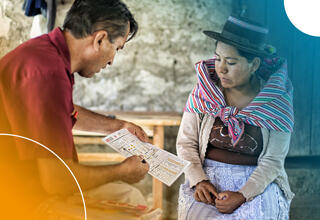Although some progress has been made in the provision of health services to women who have suffered different forms of violence, both globally and in Latin America and the Caribbean, relatively little attention has been paid to access to mental health services for survivors of violence. Especially in the current context of the global pandemic, it is particularly important to ensure adequate assessment and attention to the impact of the pandemic, as well as of the various forms of violence, on the mental health of women.
In its 2014 Voice and Agency: Empowering Women and Girls for Shared Prosperity report, the World Bank noted that exposure to violence is associated with consequences, among others, to mental health, including, for example, an increased risk of depression, post-traumatic stress disorder, and substance abuse. In addition, according to the World Health Organization (WHO), women who experience intimate partner violence are twice as likely to suffer from depression.
Therefore, in order to provide comprehensive health services, it is key to ensure that mental health services are part of the health services offered to survivors of violence. In its Clinical Manual for Health Care for women who have suffered intimate partner violence or sexual violence, the Pan American Health Organization (PAHO) offers a series of practical guides to provide care and support to these women. In addition, it includes a specific guide on supporting mental health care for survivors of violence. According to the PAHO protocol, all aspects of the health of survivors of violence must be evaluated simultaneously:
It is important to integrate mental health services and personnel as part of the health services provided to survivors of gender-base violence
While it is essential to focus on meeting the most urgent physical needs of survivors, the assessment of psychological aspects, mental health, should also be an integral part of the health services provided.
In order to contribute to the comprehensive and timely recovery of victims of violence, the Ministry of Health (MINSA) of Peru approved Health Directive No. 114-MINSA / 2020 / DIGESSP (DS) in September 2020. The Directive has as objective to standardize the technical parameters for the evaluation of the psychological affectation in cases of violence against women and members of the family group. According to the directive, the person responsible for the evaluation of this psychological affectation will be the psychologist of the health establishment closest to the person's place of residence.
The evaluation process, which will include a psychological interview, the application of psychological evaluation instruments and a desk study, will be free at the IPRESS (govenment health service provider institutions). Every user of health services will be treated with full respect for their dignity and privacy without discrimination of any kind, as well as the guarantee of confidentiality and protection of their data.
In this context, the United Nations Population Fund office in Peru (UNFPA-Peru) provided technical assistance to the Ministry of Health in the process of preparing said directive and considers it essential to support the process of disseminating it among health personnel to ensure comprehensive care for survivors of violence. Access the directive (full text) at this link: https://cdn.www.gob.pe/uploads/document/file/1346124/Resoluci%C3%B3n%20…


